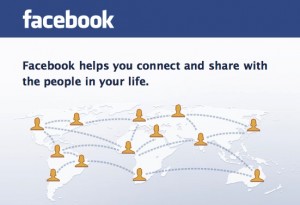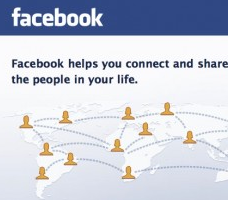According to Facebook, the average user has 130 friends. More than 100 friends is a lot to keep track of. The statistic raises the question: Does the life we lead online distract us from the one we live in the real world?
In my opinion, the ever-growing relationship people have with Facebook distracts from relationships and opportunities offline. Their dependence on Facebook takes away from face-to-face conversations that cannot be had screen-to-screen.

Statistics that add to the separation
Facebook has more than 400 million users. According to the site, 50 percent of the users log into their profile daily.
Logging into the social networking hub has become a daily task. It is often one of the first things I do when on the Internet. Most students can attest that Facebook is the easiest way to put off doing other tasks.
That procrastination has led to an average of 35 minutes spent on Facebook each day, according to the website Penn Olsen. During that 35 minutes, a user could have roughly three 12-minute face-to-face conversations with friends or relatives. Having a face-to-face conversation strengthens a relationship more than a wall post.
Zoning out and cutting ties
The time we spend around strangers is an opportunity to meet new people and create new relationships. Mobile Facebook has helped users check out of the world around them to sign into their online life.
According to the website Econsultancy, more than 65 million users access Facebook through mobile devices. The website also notes that mobile users are 50 percent more active on the social network.
I regularly see status updates and Facebook news transmitted from a mobile device. Mobile users are missing the opportunity to create relationships because of their need to maintain the ones they already have online. Disabling the mobile Facebook application could provide an opportunity to create new relationships in a way other than the Internet.
An unhealthy relationship
Our relationship with Facebook has reached a dangerous level that cuts users off from the outside world.
Psychologists agree and have recognized Facebook Addiction Disorder as a real addiction people suffer from. This only serves as an example of how important Facebook has become to many people. The site is no longer a means of entertainment, but rather a necessary part of the day.
Cutting down the use of Facebook will only benefit the important relationships in many people’s lives. More face-to-face conversations and less Facebook-ing would be a positive change.
Gina Dolski can be reached at grdolski@stthomas.edu.




“During that 35 minutes, a user could have roughly three 12-minute face-to-face conversations with friends or relatives.”
That is true, assuming your three friends or relatives are in the same room as you. But if they’re not, Facebook becomes an easy and convenient way to stay in touch. For example, if I wanted to have a face-to-face conversation with my cousin who lives in Austin, I would have to spend a lot of time and money traveling. Thankfully I can pull up the Facebook app on my phone instead and write him a message. Also, I can look at his photos, check his updates and see what other distant family members are keeping in touch. Surely one wouldn’t say such activity is hurting my relationship with my cousin. In fact, I’d argue Facebook keeps us closer.
It’s a blessing and a curse, a double-edged sword. Facebook is keeping us more connected than ever, but it’s weakening our real life interactions.
Unfortunately, it has become a necessary evil for many, myself included, to communicate. It is both effective and consuming.
I feel it’s strengthened my face-to-face interactions, allowing me to set up more get-togethers and meet ups with friends and class mates.
Facebook, along with skype and email are the only means of communication I have with my girlfriend who is studying in China. To say this “distraction” only hurts people is fairly misleading. If I had to snail mail her everytime I wanted to talk to her, that would be a huge issue. I feel this diatribe came from an emotional response and really had no other reason to be written other than to serve the writer.
“That procrastination has led to an average of 35 minutes spent on Facebook each day, according to the website Penn Olsen. During that 35 minutes, a user could have roughly three 12-minute face-to-face conversations with friends or relatives. Having a face-to-face conversation strengthens a relationship more than a wall post.”
This part particularly interested me. You broke down the 35 minutes of average time spent on facebook into the number of face-to-face conversations you could have. I think it bears to ask how many social networking interactions you could have on facebook during that time. I’m just wagering a guess, but I’d bet the sheer volume of interactions on facebook would outnumber the amount of face-to-face conversations you could have. Maybe these behaviors are related to behavioral characteristics like introversion or extroversion–some people valuing breadth and volume of social interactions over depth and emotionality of said interactions.